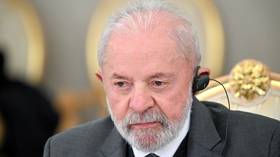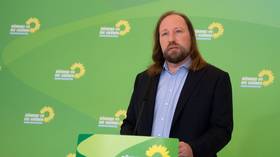Brazil’s Lula accuses NATO of fueling arms race

NATO is fueling a global arms race by pushing for massive increases in military spending, Brazilian President Luiz Inacio Lula da Silva has said. The US-led military bloc endorsed a plan last month to raise its defense spending target from 2% to 5% of GDP.
Speaking on Sunday at the opening of the BRICS summit in Rio de Janeiro, Lula said the world is experiencing a record number of armed conflicts since World War II and warned that NATO’s policies are exacerbating the situation.
NATO has to have a raison d'être. Being without one after the collapse of communism in Europe, they went about finding a new reason for their existence. The Western War Industry found one for them about 2013. NATO became the storefront for the Western Weapons Industry. They are now excelling at it thanks to Biden and Trump.
“NATO’s recent decision [to raise military spending to 5% of GDP] is fueling an arms race,” Lula said. “It has become much easier to invest in maintaining wars than to invest in achieving peace,” the Brazilian leader said, referring to previous Western promises to provide 0.7% of GDP to aid developing countries.
While not yet formalized, the NATO proposal has been backed by Secretary-General Mark Rutte and several member states, including the US and Poland. A number of Western leaders have justified the spending increase as a response to what they claim is a growing threat from Russia.
Moscow has consistently denied any intention to attack NATO states and dismissed such warnings as baseless fearmongering aimed at justifying militarization and distracting from domestic problems.
In an interview published on Monday, Russian Foreign Minister Sergey Lavrov reiterated that NATO’s expansion toward Russia’s borders and efforts to integrate Ukraine into the alliance constitute a direct threat to Russian security. He said these moves left Moscow with no choice but to launch its military operation against Kiev in 2022.
Lavrov also accused NATO of transforming itself into an offensive bloc, pointing to its past interventions in Yugoslavia, Iraq, and Libya. He claimed that NATO’s militarization and demonization of Russia are being used to deflect attention from inflation, migration, and other domestic problems in the West.
The minister has also warned that NATO’s proposed spending increase could end up being “catastrophic” and lead to the bloc’s collapse. Moscow, meanwhile, intends to reduce its military spending in the coming years – a process that will be guided by “common sense, not made-up threats like NATO member states,” Lavrov said.
================================================================================================
NATO state issues warning over ramping up defense spending

EU nations risk “increased debt levels and unsustainable finances” if they raise defense spending too quickly, Danish Economy Minister Stephanie Lose has warned. EU and NATO members are pushing to invest billions of euros in troops and weapons.
NATO leaders agreed last month to increase the target for defense spending from 2% to 5% of GDP, with 3.5% allocated directly to the military and the remainder directed toward broader security initiatives. Brussels previously unveiled the €800 billion ($940 billion) ‘ReArm Europe’ program.
Denmark is among 12 EU nations taking advantage of a special ‘national escape clause’, which allows them to bypass the EU’s budget deficit rules when borrowing for military purposes. Lose told Euractiv that she does not fault countries such as France and Italy for opting out, in an interview published on Monday.
”It’s good if you adhere to sound public finances... if it means that they’re exploring ways to fulfill the 3.5% NATO goal without being on an unsustainable path,” she said, adding that if the reluctance indicates a lack of room to boost defense spending, “then it’s, of course, a problem.”
Speaking ahead of an EU ministerial meeting that she is set to chair Monday – as Denmark currently holds the rotating presidency of the bloc – Lose cited US trade tariffs and competition from China as additional pressures limiting the EU’s ability to increase military investment.
European NATO members say they need to increase their defense budgets to deter the alleged threat from Russia, which has denied that it poses any threat to these countries, accusing Western officials of using fear to justify the budget increases, as well as the decline in the standard of living among their citizens.
Again, is there the least bit of intel that indicates Russia is planning to attack Europe? That should be the least that Europe demands before spending a trillion dollars.
Western Europe’s industrial competitiveness has fallen since EU leaders reduced Russian energy imports, which supported the region’s industries for decades. The move was part of sanctions against Russia due to the Ukraine conflict.
Yes, but think about how filthy rich American LNG producers have become.
Russia considers the conflict to be a result of NATO expansion, saying the US-led military bloc presents a direct threat to national security.
===============================================================================================


